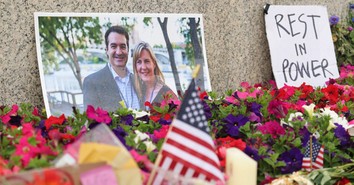Disappointing Stop-Loss the Latest Iraq War Drama

DVD Release Date: July 8, 2008
Theatrical Release Date: March 28, 2008
Rating: R (for graphic violence and pervasive language)
Genre: Drama
Run Time: 113 min.
Director: Kimberly Peirce
Actors: Ryan Phillippe, Channing Tatum, Abbie Cornish, Joseph Gordon-Levitt, Victor Rasuk, Timothy Olyphant
The key line from Stop-Loss, the latest in a growing line of disappointing dramas about the war in Iraq, is no doubt hard to hear. “F--- the president” drew applause from half the packed theater at a recent screening of the drama, but no applause greeted the conclusion of this unsurprising film.
The plot centers around the flight of Sgt. Brandon King (Ryan Phillippe), an AWOL soldier who is told on the day he thinks he’s returning full-time to civilian life that he’s instead heading back to Iraq for another tour; he’s been stop-lossed.
King objects vigorously to the order to return to Iraq. He’s been a good soldier, one his men look up to, even though his time in Iraq ends badly when he leads his men into an ambush. King’s objection to being stop-lossed is anchored in ideas of fairness. He’s served his time and fulfilled his obligation. Now he’s ready to return home. Who is the president to decide otherwise? While in Texas, King flees the Army and heads for Washington, D.C., determined to plead his case before a sympathetic legislator.
That idea is the film’s undoing. We never buy into King’s ability to avoid those looking for him. He visits with families of the fallen soldiers he once led, has close encounters with the law at his parents’ home and is conveniently out of his motel room when the cops show up and bang on the door. When calls to the elected official are brushed aside by a secretary, King pursues one final way to avoid further military service.
Along for the ride is Michele (Abbie Cornish), fleeing a relationship with King’s friend and fellow soldier Steve Shriver (Channing Tatum). She provides the film with a female presence, but her role is limited to stitching up King after he gets into a fight, and serving as an intermediary between King and those who are trying to woo him back home.
As with so many war films, tragedy is shown more through the prism of the effect of battles on these men than it is through the battles themselves. In this case, the film’s troubled vet, Tommy (Joseph Gordon-Levitt), is a drunk who’s clearly destined to come to a bad end. The only question is how quickly he’ll meet his Maker. But despite the predictable nature of that character, Stop-Loss sparks to life whenever Gordon-Levitt is on screen. One wonders how much more interesting a film centered on his character, rather than on King’s character, might have been.
The early parts of Stop-Loss are its best, but even those are marred by the been-there-done-that quality of the footage of idle soldiers. The soldiers joke, they cuss, they drink and talk about sex. However, as with similar sequences in Sam Mendes’ Jarhead, these scenes don’t amount to anything substantive. Director Kimberly Peirce changes up film speeds to give the footage of the soldiers a home-movie visual quality. Her decision to provide written titles for some of these short segments feels like a gimmick that might pay off, but the tactic is soon dropped, leaving viewers to wonder why it was employed in the first place.
The male bonding is a set-up for something more provocative that never ultimately arrives. What does work in the early stretch is a harrowing battle sequence that leads to multiple American and Iraqi deaths, as King and his men are lured into an ambush. The confusion and tension of those scenes suggests that Stop-Loss could have been a powerful war film, rather than the disjointed road movie set on the home front. A sequence at a veteran’s hospital is one of the few parts of the film’s second half that works, mainly because it shows, rather than tells, of the long road faced by veterans of the current conflict. In general, however, the film becomes much more conventional, even tiresome, as it drags toward its conclusion—a curiously overwrought family moment that doesn’t quite jell.
Despite its flaws, Stop-Loss has moments of power and is well performed—not enough to qualify it as a film worth seeing, but an indication that more successful movies about the Iraq War are within reach.
Questions? Comments? Contact the writer at crosswalkchristian@earthlink.net.
CAUTIONS:
- Language/Profanity: Lord’s name taken in vain; much profanity; a crude reference to sexual intercourse, and sex-related jokes.
- Drugs/Alcohol: Drinking; drunk driving; scenes set in a bar.
- Sex/Nudity: Kissing.
- Violence: Battle sequences with gunfire and grenades; images of dead women and children; badly wounded soldiers; struggles with post-traumatic stress; a street fight among several men, ending with gun shots.
- Religion: A soldier gets baptized.
Originally published March 28, 2008.







